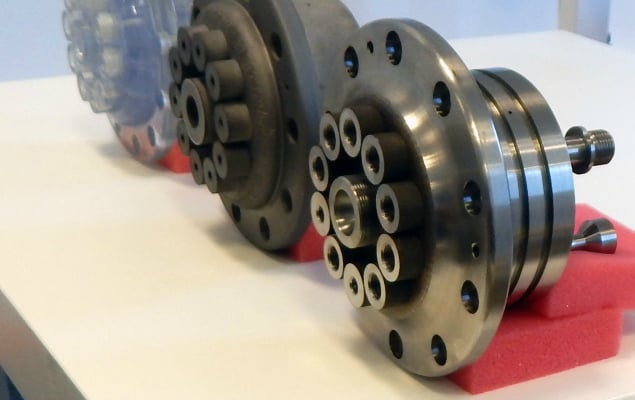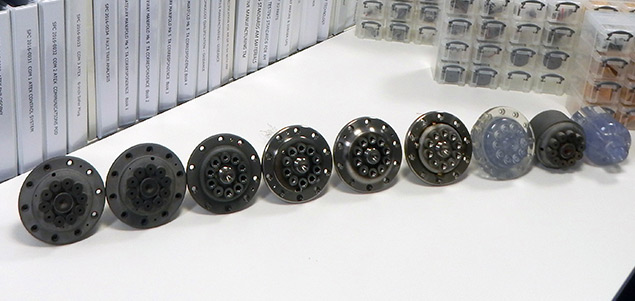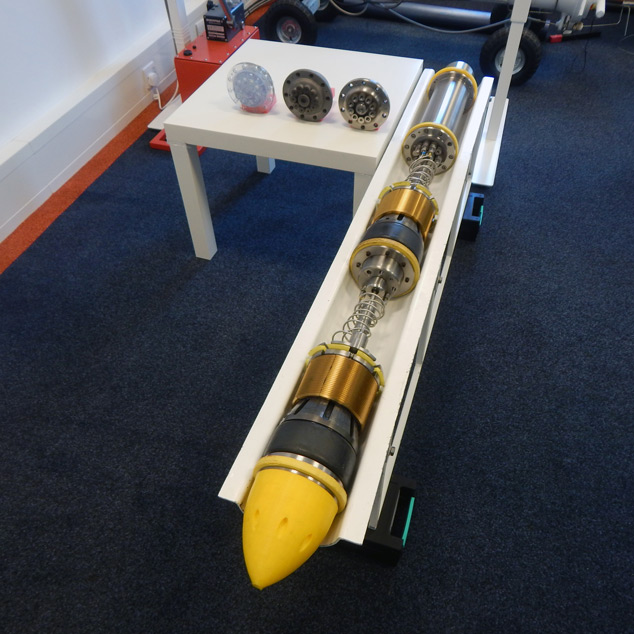LRQA today announces the first certification of a part produced through additive manufacturing (AM) for the oil and gas industry.
From left to right, Safer Plug’s gateway manifold is show in three states of manufacture: Transparent stereolithographic prototype, additively manufactured in titanium but not machined, and the final, machined titanium part.

LRQA today announces the first certification of a part produced through additive manufacturing (AM) for the oil and gas industry.
The part, a titanium gateway manifold for pipelines, was designed by Surrey, England-based Safer Plug Company (SPC) and built by the AM production company 3T RPD using powder bed fusion. The entire process was overseen and certified by LRQA using its framework, an industry first that guides manufacturers on AM processes to certify components.
"In taking on this initiative, LRQA's Additive Manufacturing group has truly opened a gateway to the future," said Ciaran Early, SPC Technical Director. "LRQA's pivotal role is to guide suppliers through the codes, standards, controls and best practices to manufacture AM parts, in order that end users will have full confidence that an AM part meets the required level of criticality for that part."
SPC approached LRQA more than a year ago in order to provide independent assurance of the manifold's manufacture, due to the innovative process it went through to design and produce it. The manifold is to be included in an assembly for a suite of pipeline isolation tools, which will include the world's smallest tool suitable for six-inch diameter pipework.
"This project is a great example of how innovative companies are making great use of additive manufacturing's benefits," said Amelia Stead, LRQA AM Surveyor and the primary technical lead on the project. "This part would have been nearly impossible to produce using traditional manufacturing techniques due to its complex internal channels."
LRQA's framework, produced alongside The Welding Institute (TWI), takes into account more than material standards. The manufacturing facility was also assessed by the LRQA team.
 "3T RPD are delighted that certification has been issued," commented Luke Rogers, New Product Introduction Project Manager for 3T RPD. "We regularly work with clients in the aerospace, medical and motorsports industries to produce metal parts. Hopefully SPC will set the example and demonstrate how the oil and gas industry can realise the benefits of AM."
"3T RPD are delighted that certification has been issued," commented Luke Rogers, New Product Introduction Project Manager for 3T RPD. "We regularly work with clients in the aerospace, medical and motorsports industries to produce metal parts. Hopefully SPC will set the example and demonstrate how the oil and gas industry can realise the benefits of AM."
Going forward, LRQA will certify the next batch of 10 manifolds produced by SPC and 3T RPD. SPC is now working with LRQA on a Type Approval certificate which would allow it and 3T RPD to produce the manifolds on demand, as well as the pipeline isolation tools.
"From an industry and customer perspective this certification provides added confidence in parts produced by this new technology," said Dr. Claire Ruggiero, Director Innovation, Technical and Quality for LR. "This will undoubtily accelerate the adoption of AM into the oil and gas mainstream. The work we have done with TWI has provided the robust basis for this certification and we look forward to further building our expertise and experience together with the industry pioneers like SPC."
"It's crucial that new technologies are embraced by the oil and gas industry," said Andrew Imrie, LRQA Global Product Launch Manager. "LRQA is at the forefront of supporting these new technologies, enabling the industry to bring certified products to market with the proper assurance and confidence."
LRQA is involved in several AM projects within the nuclear, marine and construction industries as well. It currently operates three joint-industry projects with TWI which are open to companies who'd like to learn more about the AM process.
For more information, please visit Additive Manufacturing Certification & Training | LRQA UK
Above, the gateway manifold is shown inside Safer Plug’s assembled pipeline isolation tool.


